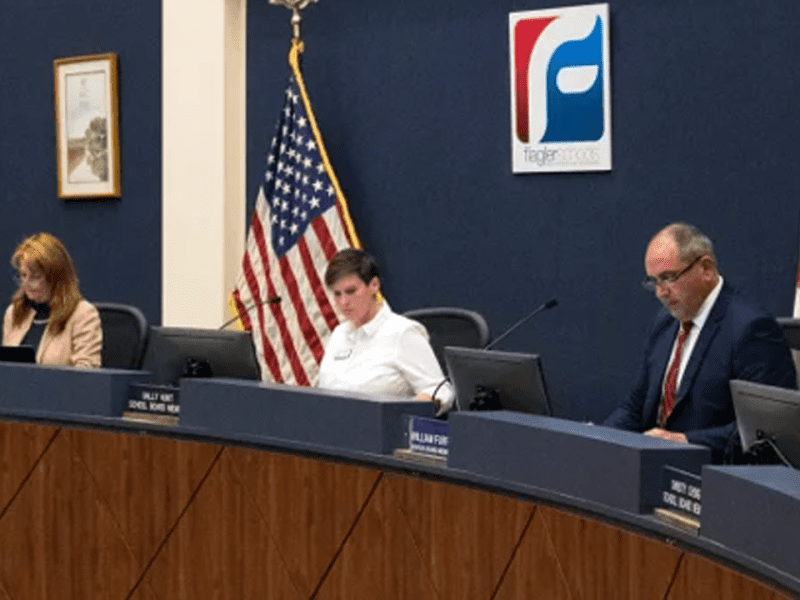School Board interviews superintendent finalists
5 seeking district’s top job shared their ideas on Wednesday
Herald-Tribune By Ryan McKinnon July 2, 2020
It was a whirlwind day for the five applicants hoping to be the next superintendent of Sarasota County Schools, and the School Board will have much to consider before making a choice on July 14.
The finalists toured the district, met with executive leaders, participated in a community question and answer session and interviewed with the School Board.
Here’s what they had to say during School Board interviews:
Brennan Asplen, Deputy Superintendent, St. Johns County School District
Asplen described himself as a leader who regularlycommunicates with staff at all district levels, talking to teachers about how to best align their instruction for students with special needs and getting feedback from custodians on how well behavior programs were working.
“We need to come up to solutions to problems,” he said. “We need to listen to what teachers and nonin-structional folks are saying.”
Asplen has been in executive leadership in St. Johns since 2011, and the district has regularly ranked at the top of the state for student performance.
He described several initiatives that have helped student achievement: intervention blocks where teachers share students who need help in specific areas, sending content specialists to each school and making sure teachers know how to accommodate their content for students with special needs
St. Johns County has 21% of its students on free and reduced-price lunch, compared to 48% in Sarasota, and Asplen addressed his experience working with children in poverty, highlighting his experience as the principal of high-poverty Title I school in Seminole County, which he helped lead from a C to an A in one year.
He said St. Johns had reapportioned Title I funds to be concentrated in the highest poverty schools to maximize their impact.
Being entrenched in the community is key to success as a superintendent, he said.
“You can build that relationship with them so they can trust you,” Asplen said.
Peter Licata, regional superintendent, School District of Palm Beach County
Licata spoke frequently of the need to listen to all the voices in the community, not just the ones with influence.
He said experience had honed his approach as a leader, describing a plan he devised to rezone middle schools that faced major community opposition. He said over three to four years, he spent time in the neighborhoods impacted, talking to leaders, parents, and the people who wouldn’t be at a board meeting.
“Catastrophic decisions are made in isolation, and that is not a way to lead,” Licata said. “… I had to hear what everyone else wanted, not just what Pete Licata wants.”
Licata described how important focusing on specific goals is for a district, highlighting an effort he led to get more English Language Learners and students with disabilities into accelerated credit programs that increased total enrollment from those groups by 20%.
Teacher retention is a top priority.
“Most teachers leave after three to five years,” he said. “We have to really look at that and work with the union.”
Licata said the new superintendent for Sarasota will face major challenges, emphasizing the need for flexibility as districts develop plans for reopening schools in the fall.
“We have to pivot and we have to pivot fast and we have to be innovative,” he said. “… A few superintendents around the state have cemented their feet in plans and now they are backtracking with some heavy feet.”
Keith Oswald, deputy superintendent, School District of Palm Beach County
Oswald said he was inspired to go into education because his biological father never learned to read, and he started his career working in special education.
In addition to his time working in South Florida, Oswald worked for the New York City Board of Education, where he supervised schools in the Bronx during a time of major education reform under former Mayor Mike Bloomberg.
Oswald touted his history as a principal improving high-poverty schools that had a long history of low test scores, and said helping teachers grow in their careers is one of his top priorities.
“The majority of our dollars are spent on human capital so how we develop our people is just critical,” he said. “… The higher you go on the organization chart, the more you have to serve.”
Oswald described several solutions he helped implement. A discipline dashboard that he helped launch showed schools what behavior issues they faced so that they could develop strategic responses. And as a principal he helped convince the College Board to offer the SAT during the school day to increase the number of students who would consider college.
His driving passion is finding solutions to the challenges that plague high poverty schools, many of which were there when he began his teaching career began decades ago.
“It frustrates me that we are still trying to figure this out,” Oswald said, adding that educators have the “moral responsibility” to reach all students.
Gonzalo La Cava, chief of human resources, School
District of Palm Beach County
La Cava grew up as the first generation son of immigrants in generational poverty, and he said one of his main goals would be ensuring parents have the resources they need.
Partnering with parents to ensure they understand how to help their child thrive — from pre-K through the college application process — is personal for La Cava, who was an English Language Learner as a student.
La Cava has held many leadership positions in both Florida and Georgia, including a stint as an area superintendent in Fulton County Schools, outside of Atlanta. In his current role overseeing HR, La Cava emphasized the need for retaining high quality teachers.
“Leadership is all about people,” he said. “… This is a people business.”
La Cava stressed the importance of having a collaborative and transparent relationship with the School Board, and cited as a marker of success is closing the achievement gap among students.
“We have a pool of children we need to address quickly and we need to accelerate,” he said.
Asked about his greatest professional disappointment, La Cava described lesson learned while serving as executive director for special education in Fulton County Schools. While trying to implement new ESE programs, he had left out key stakeholders, exacerbating a tense situation, he said.
The takeaway has stayed with him.
“Always start with making sure that everyone who needs to be involved is involved,” La Cava said. “Be transparent.”
Marie Izquierdo, chief academic officer, Miami-Dade County Public Schools
Izquierdo described school as her “happy place” growing up, where she escaped the stress of being a child of workingclass immigrants She began her teaching career with a class of potential dropouts, and her first principal job was at school in the neighborhood where she grew up. Turning that school around from a D to an A led to a job overseeing turnaround efforts for all of South Florida.
Many strategies she has helped develop have since been embraced by districts across the country, and she said Miami-Dade’s progress had “changed the narrative of what an urban school district is able to achieve.”
One of those efforts included using Title I funding to stop the exodus of high quality teachers from the most challenging schools by rewarding them with up to $11,500 per year based on both longevity and performance.
Izquierdo said she is a tactical thinker who makes decision trees in her head. When school closures were a possibility in March, her team had already begun running different scenarios and prototyping plans in case of prolonged closures.
She was one of three finalists for the superintendent position with Boston Public Schools, and she said she had not been interested in other Florida superintendent positions until Sarasota’s opened.
“I am convinced that my leadership style, my experience and my expertise are very much aligned to the work ahead in Sarasota County,” she said.





